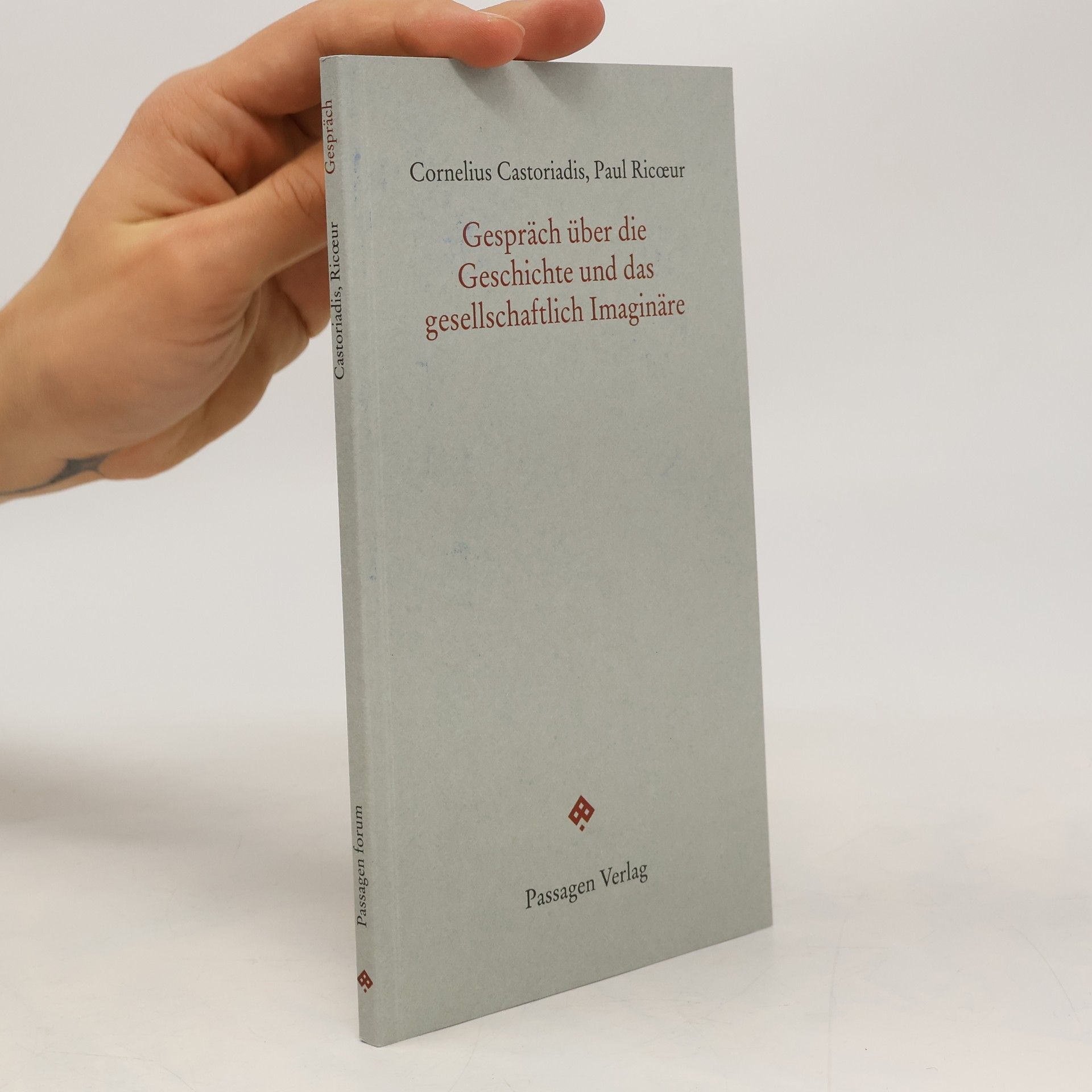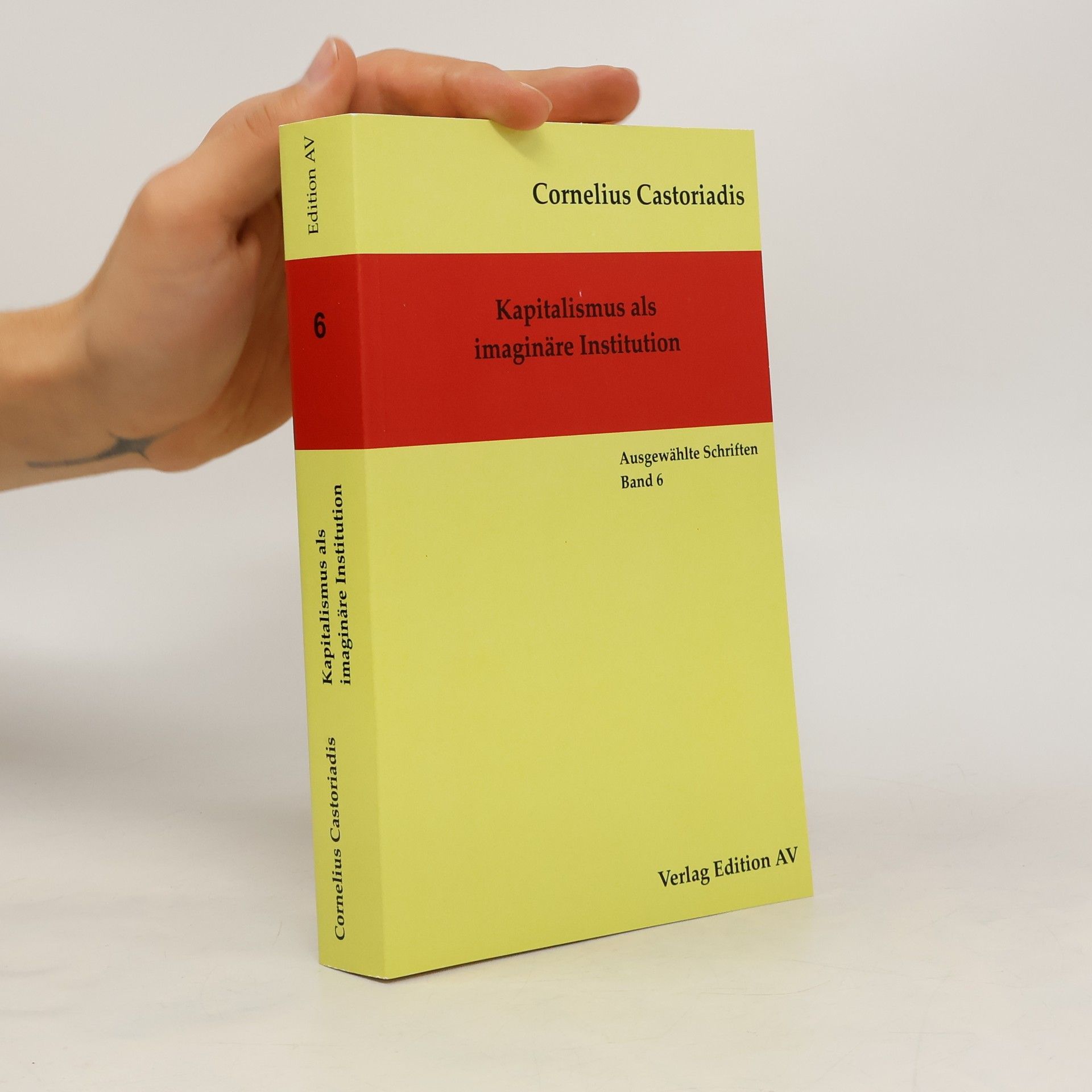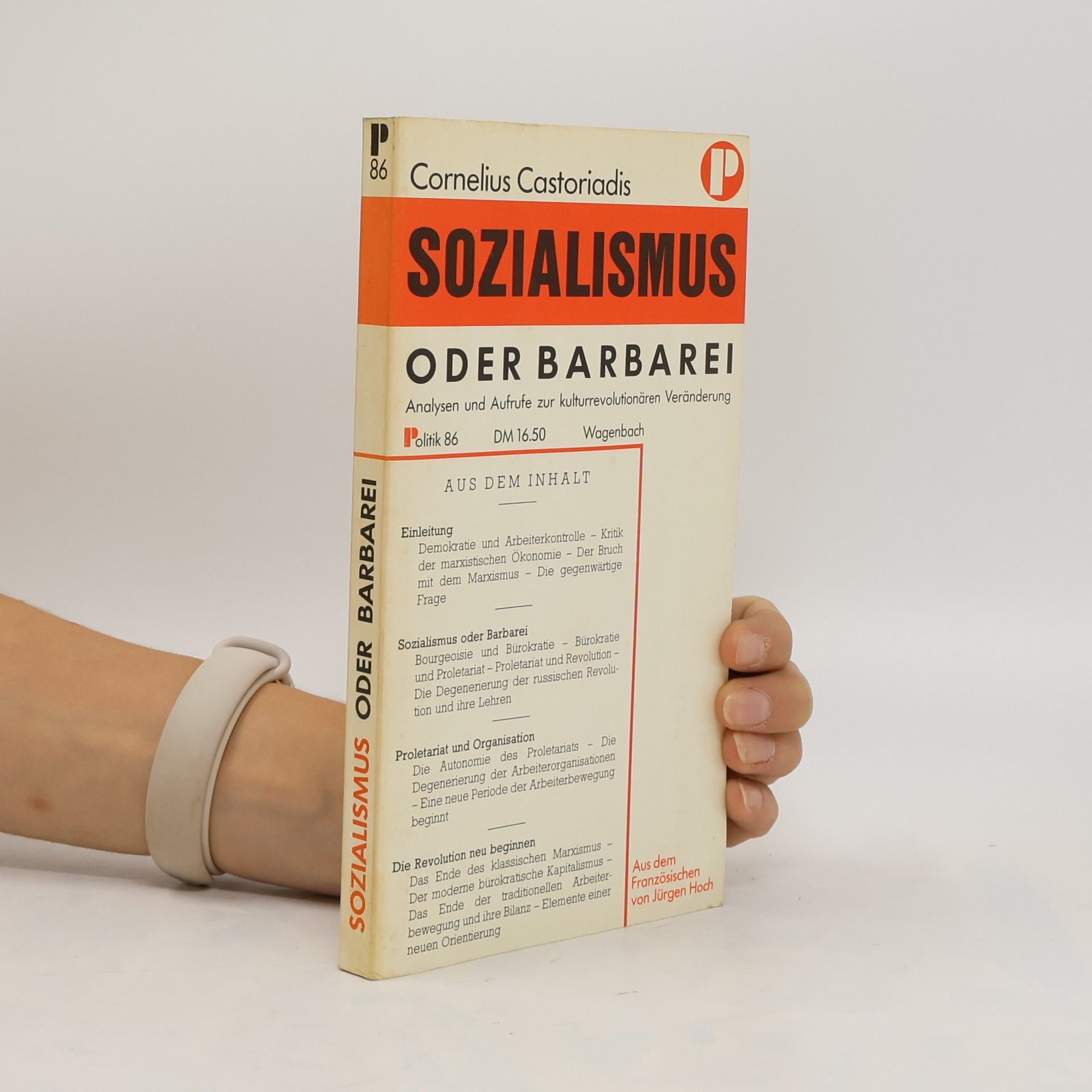The collection features 12 untranslated lectures by Castoriadis from 1982-1983, emphasizing the relationship between philosophy and democracy. He explores how both concepts arise from a self-critical imaginary, tracing their roots back to early Greek poets and Presocratic philosophers. The work delves into the evolution of thought and the cultural context that shaped these foundational ideas.
Cornelius Castoriadis Libros
Cornelius Castoriadis fue un filósofo y crítico social griego cuya obra se caracteriza por su extraordinaria amplitud y continuidad. Abordó campos diversos que van desde las matemáticas y la física hasta el psicoanálisis y la política. Una contribución clave es su idea de que el cambio social surge a través de lo 'imaginario social' como una discontinuidad radical que debe ser establecida institucionalmente para obtener reconocimiento. Castoriadis redefinió a menudo términos tradicionales, invitando a los lectores a una comprensión más profunda de su marco conceptual específico. Sus escritos han influido significativamente en el pensamiento europeo y continúan generando interés entre académicos y el público.






L'institution imaginaire de la société
- 540 páginas
- 19 horas de lectura
" L'aliénation ou hétéronomie de la société est auto-aliénation; occultation de l'être de la société comme auto-institution à ses propres yeux, recouvrement de sa temporalité essentielle... A ce point de vue, une part essentielle de la pensée héritée n'est que rationalisation de cette hétéronomie de la société et, comme telle, une de ses manifestations. Ses réponses à la question du monde et de l'histoire se situent toujours sur un terrain d'où sont, par construction, exclus l'imaginaire radical comme social-historique et comme imagination radicale, l'indétermination, la création, la temporalité comme auto-altération essentielle. " Critique sans concession de la " pensée héritée " sur la politique, la société et l'histoire, et en particulier de sa version marxiste, ce livre inclassable s'est affirmé comme une des oeuvres majeures de la deuxième moitié du XXe siècle, au carrefour de la politique, de la philosophie, de la psychanalyse et de la réflexion sur la science.
Cornelius Castoriadis
- 46 páginas
- 2 horas de lectura
Im Mittelpunkt des Denkens des politischen Philosophen, Ökonomen, Sozialkritikers und Psychoanalytikers Cornelius Castoriadis (1922–1997) stehen drei wichtige, eng miteinander verknüpfte Begriffe: das Imaginäre, Kreation und Autonomie. Sie verweisen auf das breite Spektrum von Bedeutungen, durch die eine Gesellschaft symbolische Formen und institutionelle Strukturen entwickelt, um ihre Identität zum Ausdruck zu bringen. Die von Castoriadis 1948 gemeinsam mit Claude Lefort gegründete linksradikale Gruppe Socialisme ou Barbarie beeinflusste zahlreiche Arbeiterbewegungen in ganz Europa. Für seine Notizen zu Themen aus den Bereichen Philosophie, Wirtschaftswissenschaften, Politik, Mathematik und Psychoanalyse, aus denen hier eine durch den Kulturtheoretiker Nikos Papastergiadis getroffene Auswahl abgedruckt ist, verwendete er nie ein Notizbuch, sondern was eben greifbar war, seien es die Rückseiten von Lebensmittelkarten oder die Leerzeilen eines Tagungsprogramms. Mit einer Einführung von Nikos Papastergiadis (*1962) Professor für Kulturwissenschaft und Medien & Kommunikation an der Universität von Melbourne.
Gesellschaft als imaginäre Institution
Entwurf einer politischen Philosophie
- 612 páginas
- 22 horas de lectura
Die Schwierigkeiten, die sich dem revolutionären Entwurf einer Aufhebung der Entfremdung entgegenstellen, liegen Castoriadis zufolge darin, daß das abendländische Denken die Seinsweise des Gesellschaftlich-Geschichtlichen verkennt und verkennen muß. Das philosophische und wissenschaftliche Denken beruht auf einer Onto-Logik, die das Neue, Schöpferische radikal ausschließt. Anhand einer Lektüre von Platons Timaios zeigt Castoriadis, wie die Philosophie die logisch-ontologischen Fundamente dafür gelegt hat, daß das geschichtliche Anderswerden durch die Institution einer metrischen, ›veräumlichten‹ Zeit auf die bloße Wiederholung des schon Vorhandenen reduziert werden konnte. Castoriadis zeigt im einzelnen, welche Operationen (nicht im Sinne einer transzendentalen Konstitution, sondern einer gesellschaftlich-geschichtlichen Institution) immer schon vollzogen sein müssen, damit die Welt als Ensemble identischer Elemente, die sich beliebig zu Mengen vereinigen und in Teilmengen zerlegen lassen, vorgestellt werden kann.
Gespräch über die Geschichte und das gesellschaftlich Imaginäre
- 72 páginas
- 3 horas de lectura
In ihrem Gespräch diskutieren die beiden Philosophen über die Frage, inwiefern das Imaginäre für das Verständnis von geschichtlicher Veränderung von Bedeutung ist, und spüren auf diese Weise den Möglichkeiten emanzipativer Politik nach. Castoriadis und Ricœur verbindet sowohl ihr Rückgriff auf die Psychoanalyse Freuds und Lacans als auch ihr kritisches Verhältnis zum Marxismus – darüber hinaus könnten ihre jeweiligen Temperamente und philosophischen Stile jedoch kaum unterschiedlicher sein, wie dieses 1985 für den französischen Rundfunk aufgezeichnete Gespräch zeigt. Den Hintergrund ihres Dialogs bildet die Frage, wie radikale politische Veränderung jenseits des Rückgriffs auf eine teleologische Geschichtskonzeption gedacht werden kann. Dabei zeigt sich, dass die Auffassungen der beiden Denker vor allem in der Frage nach den politischen Handlungsmöglichkeiten, die den Menschen in konkreten geschichtlichen Situationen offenstehen, auseinandergehen. Castoriadis’ These einer „geschichtlichen Schöpfung“ hält Ricœur eine Dialektik von geschichtlicher Innovation und Sedimentierung entgegen.
„Die Autonomie der Individuen, ihre Freiheit (.), hat auch vor allem die gleiche Teilhabe aller an der Macht zum Inhalt, ohne die es natürlich keine Freiheit gäbe, ebenso wenig wie Freiheit ohne Gleichheit. Wie könnte ich frei sein, wenn andere als ich über das entscheiden, was mich betrifft und ich an dieser Entscheidung nicht teilnehmen darf?“ Cornelius Castoriadis Der Anstieg der Bedeutungslosigkeit Demokratie als Verfahren und Demokratie als System Welche Demokratie? Wesen und Wert der Gleichheit Macht, Politik, Autonomie Die Bewegungen der sechziger Jahre Die Idee der Revolution
Sozialismus oder Barbarei
- 180 páginas
- 7 horas de lectura
Durchs Labyrinth
- 305 páginas
- 11 horas de lectura
Gemessen an den philosophischen Konzepten, die gegenwärtig in immer kürzeren Konjunkturzyklen einander folgen – zuletzt Strukturalismus, »Wunschökonomie« und »Neue Philosophie« –, muten die philosophischen Fragen, die Castoriadis an die Wissenschaften richtet, »ziemlich eigensinnig« an, wie er selbst sagt. Aber gerade dieses Fragen, das sich beispielsweise auf Aristoteles beruft, wenn es sich nach der Natur eines Gegenstandes oder dem Gehalt einer Theorie erkundigt, macht auf Aporien aufmerksam, die der Positivismus und der Strukturalismus leichthändig verdrängt haben. Wie sehr der szientistische Anspruch den Blick auf die Gegenstände vorstellen kann, belegt Castoriadis unter anderem in einer exemplarischen Auseinandersetzung mit der Psychoanalyse.
Arbeiterräte und selbstverwaltete Gesellschaft
- 143 páginas
- 6 horas de lectura



